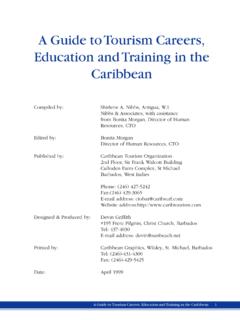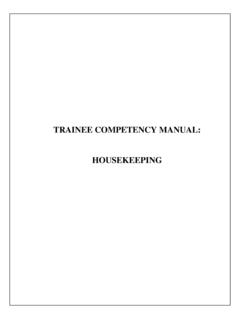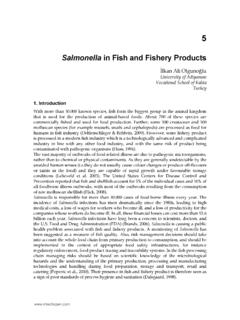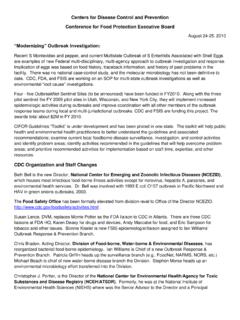Transcription of Quality Tourism for the Caribbean (QTC)
1 CAREC/CHA/CASTQ uality Tourism for the Caribbean (QTC) Quality Tourism for the Caribbean (QTC)2ndRegional Sustainable Tourism Policy and Planning W shop, March 21, 2006St LuciaDr C. James HospedalesCAREC/CHA/CASTO verviewOverview Background Sustainable ( Tourism ) development in Caribbean Health and environment issues; Quality Tourism for the Caribbean Caribbean Tourism , Health, Safety and Resource Conservation Project 1999-2003 (QTC-1) QTC Health, Safety & Environment Standards Implementation and Certification Proposal (QTC-2) Policy & Planning issuesCAREC/CHA/CASTV ision for Sustainable Vision for Sustainable Caribbean DevelopmentCaribbean DevelopmentTrade & Economic Measures( Tourism )EnvironmentalConservati onHealth & Education -for Social CapitalThree Good GovernanceCaribbean Group for Cooperation in Economic DevelopmentCAREC/CHA/CASTV ision for Caribbean TourismVision for Caribbean Tourism "To be the Safest, Happiest, and Healthiest of Comparable Destinations in the World Quality Tourism for the Caribbean , 1999 CAST/CARECCAREC/CHA/CASTJ ourneying TogetherJourneying TogetherCAREC/CHA/CASTF actors Affecting a Traveler s Health Factors Affecting a Traveler s Health Visitor FactorsHospitality IndustryAgent & environmental factorsKnowledge, Behavior.
2 Sunscreen,seatbelt & condom use,alcohol and drugsSusceptibility & resistance to local problemsDengue, , mosquitoesHeat &humiditySafe food & water,recreational water, waste water,access to health careInjury hazards; , traffic, assaultSafe, Happy,HealthyGuests &StaffNational & RegionalPolicies, Planning & Development, Infrastructure, health servicesStreet FoodCAREC/PAHO/WHOCAREC/CHA/CASTC aribbean Travel & TourismCaribbean Travel & Tourism $ industry 23 million stay-over arrivals 18 million cruise ship arrivals 252,300 hotel rooms; 2,200 hotels Contribution to Caribbean GDP = 15% Contribution to Caribbean employment = Majorityof hard currency earningsCAREC/CHA/CASTH ealth & Tourism Issues: Infectious DiseasesHealth & Tourism Issues: Infectious Diseases Food and water-borne disease(10-58% tourists got TD in mid-late 90s; decreased to 6-35% in mid-2000s; tour op data) Vector borne diseases Dengue fever, malaria, West Nile Virus Respiratory diseases Legionnaires disease, SARS, Bird Flu Vaccine preventable diseases Measles and rubella, polio( Caribbean free of these), hepatitis B Sexually Transmitted infections HIV/AIDS, sexually transmitted infections; Skin and ear infectionsCAREC/CHA/CASTF oodborneFoodborneDisease Outbreaks in IndustryDisease Outbreaks in Industry From 2000-05, over 55 reported outbreaks of food and water borne illnesses; >2,600 guests and staff at tourist-based hotels from 14 Caribbean countries Tobago 2002: Twin-hotel, food poisoning outbreak; likely source water; 70 ill, hotel closed for 3 months; 190 staff on breadline Turks & Caicos Is.
3 2003: Outbreak of Shigellafood poisoning; likely source -food handler contaminating juice Jamaica 2002, 04/05: Multiple hotel outbreaks; salmonella enteritidis; source eggs; investigation helped avoid US Travel Advisory against Jamaica Cruise ship industry outbreaks (>10 in 2003)CAREC/CHA/CASTD eteriorating National, Regional Deteriorating National, Regional and International Environment and International Environment Recent studies on region sound warnings on natural and social environment trends: National Geographic Magazine, March 2004: Caribbean destinations getting ugly due to declining natural environment & visitor experience World Travel & Tourism Council, June 2004: Growing importance of Tourism to the regional economy but warned, declining Quality of the natural resource base and its impact on the Caribbean Tourism product World Resources Institute, September 2004: Caribbean reefs at risk of further degradation, particularly in areas where human activities are predominant, , in coastal areas and upland watersheds Yale Centre for Environmental Law and Policy, January 2005.
4 Trinidad & Tobago near bottom in Environmental Sustainability League Tables (139thout of 146 countries studied; down from 121stplace in 2002 report)CAREC/CHA/CASTE rosion of stream bed in St Lucia; silt deposits kill reefsCAREC/CHA/CASTG arbage blocking drainage through sluice gates in Guyana floodsJan 2005 CAREC/CHA/CASTH ealth & Environment Issues: InjuriesHealth & Environment Issues: Injuries Un-intentional injuries Burns, falls, stings/bites, traffic injuries, boating/sporting injuries, poisoning/food allergies Intentional injuries Assault, rape, homicide, suicide Substance abuse Alcohol, marijuana, cocaine ?Bio-Terrorism (BT)hidfdCAREC/CHA/CASTB ackground to QTC ProgramBackground to QTC Program Preventable, health and environment problems in Tourism industry Costly: >$US200M foregone to industry in last 8 yrs Realisationof no Caribbean -wide standards for health & environment (CAREC/CHA Conference May 1996) Caribbean Tourism , Health, Safety and Resource Conservation Project: Funding from IADB/MIF, CDB, CAREC/PAHO, CHA/CAST 1999 to 2002 (full operations).
5 2003-present (reduced ops CAST-CAREC/PAHO Memo of Agreement Public/Private, Regional/Nat l Steering Committee Countries: T&T, B dos, Jam, Bah & OECS CAREC/CHA/CASTCTHRSCP Main Outcomes CTHRSCP Main Outcomes First indigenous Caribbean -wide Tourism industry standards for health, safety and environment Needs Assessment Surveys hotels and food establishments Training 1,500 public and private sector personnel in food safety, and environmental management QTC Brand developed Certification Program options study Sensitization of health and Tourism sectors to import of health and environment in profitable and sustainable Tourism CAREC-CAST public-private partnership establishedCAREC/CHA/CASTE merging Recognition of QTCE merging Recognition of QTC Many countries and hotel associations requesting program Training in food safety and QTC standards by CAREC 8thEDF EU Project support via CHA & CTO CROSQ buy-in and participation Association of Caribbean states (ACS).)
6 Ref QTC standards in sustainable Tourism indicators Tourism Zone framework Tour operators asked QTC to do work on their behalf OAS-Organisedmeeting Feb 2006: QTCconsidered best home-grown candidate for the Caribbean operating HSE standard for Tourism establishments CAREC/CHA/CASTQTC Standards Development QTC Standards Development Caribbean (Jam, T&T, B dos), US, UK, tour op standards reviewed; private-public, multi-disciplinarystandards sub-committee Benchmarked and tested in 42 hotels in 6 countries Integrated Clean and Green assessment/audit approaches tested; responsive to industry needs Food Safety Standard first revision in 2003 6 Environmental standards reviewed 2005 CAREC/CHA/CASTQTC StandardsQTC Standards Food Safety and Sanitation Environmental Management System Water Treatment, Management and Efficiency Sewage Treatment Management Energy Management and Efficiency Integrated Pest Management Solid Waste Management Occupational Health and Safety Air Quality and Pollution Control Physical & Personal Safety, Security and Disaster Planning Protecting Natural Resources and Managing the us of Coastal Areas Community RelationsCAREC/CHA/CASTQTC is UniqueQTC is Unique Combines Health and Environment Dimensions; Clean and Green CAREC/CHA/CASTQTC Food Safety & Sanitation StandardQTC Food Safety & Sanitation Standard Food Safety and Sanitation Standard ( CAST & CAREC2003).
7 Incl. implementation guide, self-assessment questionnaire, audit-scoring system; industry guide Enterprise assessment/certification Management system (20%) Performance/prescriptive standard (80%) Critical, non-critical and good practice classification with weighted scoring system Major musts (5 pts), minor musts (3 pts) and shoulds(1 pt) Graded scoring system to monitor progressionCAREC/CHA/CASTL essons LearnedLessons Learned Possible to develop region wide standards; Many challenges, need to persevere Anxiety of private sector re adverse publicity, illness surveillance, reporting Absence of documentation in properties Functional literacy levels Many interests nat l, regional, int l; public-private; tour ops; guests; staffCAREC/CHA/CASTL essons Learned from the Lessons Learned from the Project EvaluationProject EvaluationProject delivered on most of its objectives Insufficient attention to promotion & marketing Public-Private partnership at regional or national level Major strength and major challenge balancing interests and involvement of key stakeholders All stakeholders unanimous that Caribbean -wide standards a tremendous achievement and that a necessary and logical next step is to implement the standards with matching audit and certification Program for the QTC standard CAREC/CHA/CASTQTC HSE Standards QTC HSE Standards Implementation ProposalImplementation Proposal QTC Program Vision: the safest, healthiest and happiest of comparable destinations in the world!
8 Goal: To increase the Quality , safety, competitiveness and sustainability of the Tourism sector in the Caribbean Region and thereby improve the Tourism sector s Quality and ability to maintain its market position on a global level. CAREC/CHA/CASTQTC Programmatic FrameQTC Programmatic FrameInfo dissem; sustplanFinanceICTS tandard CertificatnTraining & HRDC onsensus bldgDORSurGuy BlzOCTsOECSBahJamBarT&TRegionElementCARE C/CHA/CASTQTCQTC--2 Proposed Outputs2 Proposed Outputs Proposed Time Frame = 3 years 300 Tourism enterprises enrolled (public/private/community) 100 Tourism enterprises QTC certified (P/P/C) Train and accredit 150 in-country assessors/auditors Achieve harmonisationand reciprocity: National ( , Jamaica) and International ( , Tour operators/FTO, Green Globe 21) Certification accessibility by SMEsCAREC/CHA/CASTI ndicators of GoalIndicators of Goal Within two years after completion of the project: Reduction in the number of reported traveler-related illnesses and injuries Improvement in key indicators of environmental sustainability Improvement in operating results of SMEsparticipating in the project Increase in visitor satisfaction CAREC/CHA/CASTP urposePurpose By the end of the project.
9 At least 300 SMEshave enrolled in the project and are participating in developmental least 100 SMEshave applied for or received QTC standards promulgated by the project have been approved by Council of Trade and Economic Development (COTED) of CARICOM and have been integrated into the standards frameworks of the countries participating in the Proposal Components2 Proposal Components Establish QTC as the operating standard for HSE for Caribbean Tourism operations Awareness, sensitisationand consensus building with national, Caribbean regional and International Tourism industry stakeholders Training and human resource development Establish a regional and accessible QTC certification system andservices support framework Dissemination of Lessons Learned and Sustainability of QTCCAREC/CHA/CASTC ertificationCertification A tool for promoting the adoption of standards and giving travelers and their agents a basis for informed choice The process of providing documented assurance that a product, service, or management system conforms to a standard.
10 Or that a person is competent to perform a certain taskCAREC/CHA/CASTC ertification Benefits and IncentivesCertification Benefits and Incentives Improved performance -reducing ecological impacts and improving health & safety Operational cost reduction, income generation, superior management practices sustainability Maintenance of demand/supply markets Profitability through process efficiency reducing waste, direct and indirect costs Improved public image Improved staff morale, performance and creativity Reduced enterprise liability and insurance premiumsCAREC/CHA/CAST Institutional strengthening, cross-sectoral partnerships and industry linkages: Steering Committee (Countries, CAREC/PAHO, CAST/CHA, CTO, CROSQ) Multi-sector stakeholder groups, technical & advisory committees: Country: Health/ Tourism /Environment ministries/agencies etc. Regional: CHA/CAST, PAHO/WHO/CAREC, CARICOM/CROSQ, CTO, ACS, CEHI, Cruise, insurance industry etc. International: ISO, WTO, etc.















